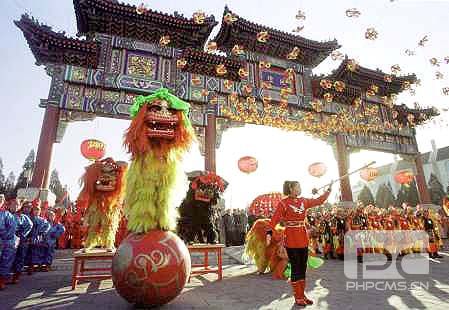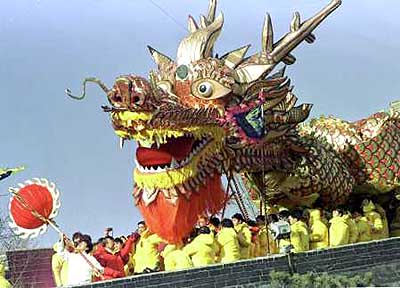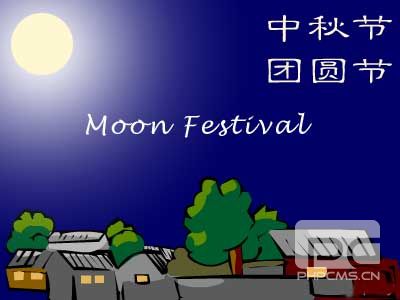Online Courses
Study in China
About Beijing
Traditional Holidays
Spring Festival
10420_007.jpg (44815 bytes) The Spring Festival to the Chinese people is as important as Christmas to people in the West. to ordinary Chinese, the festival actually begins on the eve of the lunar Nee Year' Day and ends on the fifth day of the first month of the lunar calendar. The 15th of the first month, which normally is called the lantern Festival, marks the official end of the Spring Festival in many parts of the country. Guo Nian, meaning passing the year, is the common term among the Chinese people for celebrating the Spring Festival. It actually means greeting the new year. At midnight at the turn of the old and new years, people used to let off firecrackers to greet the arrival of the new year. In an instant the whole city would be engulfed in the deafening noise of the firecrackers. In 1993, however, the Beijing People's Congress adopted are solution to ban the letting off of firecrackers and fireworks in the city proper for considerations of safety and environmental protection. Therefore there will be no more firecrackers for the city during the Spring Festival. But a cassette recorder company has already produced a cassette that records the joyous noise of firecrackers for those who're nostalgic of the old custom. One of the popular activities among Beijing residents during Spring Festival is a meat dumpling feast on New Year's Eve. That evening, all the members of the family would sit around a table making meat dumplings.
The Spring Festival to the Chinese people is as important as Christmas to people in the West. to ordinary Chinese, the festival actually begins on the eve of the lunar Nee Year' Day and ends on the fifth day of the first month of the lunar calendar. The 15th of the first month, which normally is called the lantern Festival, marks the official end of the Spring Festival in many parts of the country. Guo Nian, meaning passing the year, is the common term among the Chinese people for celebrating the Spring Festival. It actually means greeting the new year. At midnight at the turn of the old and new years, people used to let off firecrackers to greet the arrival of the new year. In an instant the whole city would be engulfed in the deafening noise of the firecrackers. In 1993, however, the Beijing People's Congress adopted are solution to ban the letting off of firecrackers and fireworks in the city proper for considerations of safety and environmental protection. Therefore there will be no more firecrackers for the city during the Spring Festival. But a cassette recorder company has already produced a cassette that records the joyous noise of firecrackers for those who're nostalgic of the old custom. One of the popular activities among Beijing residents during Spring Festival is a meat dumpling feast on New Year's Eve. That evening, all the members of the family would sit around a table making meat dumplings.
A Day in Memory of A Patriotic Poet
 The fifth day of the fifth month of the lunar year is an important day for the Chinese people. The day is called Duan Wu (meaning Day of Right Mid-Day) and is observed everywhere in China. It all originates from folklore. It says that Qu Yuan, a patriotic poet of the State of Chu during the Warring States Period more than 2,000 years ago, drowned himself in the Miluo River in Hunan Province because the corrupt king of Chu refused to listen to his advice. The State of Chu was soon annexed by the State of Qin. Later the local people made rice dumplings wrapped in redelivers and threw them into the Miluo River in the hope that fish in the river would eat the rice dumplings instead of the body of the deceased poet. People today still practice this custom, but they eat the dumplings instead of throwing them into the river. Another activity during the day is the dragon boat race. It also has something to do with the drowning of the poet. at first the local people raced out in boats in the hope of rescuing the poet. Later boat race became an activity and the boats gradually developed into dragon boats.
The fifth day of the fifth month of the lunar year is an important day for the Chinese people. The day is called Duan Wu (meaning Day of Right Mid-Day) and is observed everywhere in China. It all originates from folklore. It says that Qu Yuan, a patriotic poet of the State of Chu during the Warring States Period more than 2,000 years ago, drowned himself in the Miluo River in Hunan Province because the corrupt king of Chu refused to listen to his advice. The State of Chu was soon annexed by the State of Qin. Later the local people made rice dumplings wrapped in redelivers and threw them into the Miluo River in the hope that fish in the river would eat the rice dumplings instead of the body of the deceased poet. People today still practice this custom, but they eat the dumplings instead of throwing them into the river. Another activity during the day is the dragon boat race. It also has something to do with the drowning of the poet. at first the local people raced out in boats in the hope of rescuing the poet. Later boat race became an activity and the boats gradually developed into dragon boats.
Moon Festival
 On the 15th day of the eight month of the lunar calendar, the moon is full and the Chinese people celebrate the Moon(or Mid -autumn)Festival. The round shape to a Chinese means family reunion. Therefore the Moon Festival is a holiday for members of a family to get together wherever it is possible. On that day sons and daughters will bring their family members back to their parents' house for a reunion. Sometimes people who have already settled overseas will come back to visit their parents on that day. As every Chinese holiday is accompanied by some sort of special food, on the Moon Festival, people eat moon cakes, a kind of cookie with fillings of sugar, fat, sesame, walnut, the yoke of preserved eggs, ham or other ingredients. In Chinese fairy tales, there live on the moon the fairy Chang E , a wood cutter named Wu Gang and a jade rabbit which is Chang E's pet . In the old days, people paid respect to the fairy Chang E and her pet the jade rabbit. The custom of paying homage to the fairy and rabbit is gone,but moon cakes are showing improvement every year. There are now hundreds of varieties a month before the arrival of the Moon Festival.Some moon cakes are of very high quality and very delicious.
On the 15th day of the eight month of the lunar calendar, the moon is full and the Chinese people celebrate the Moon(or Mid -autumn)Festival. The round shape to a Chinese means family reunion. Therefore the Moon Festival is a holiday for members of a family to get together wherever it is possible. On that day sons and daughters will bring their family members back to their parents' house for a reunion. Sometimes people who have already settled overseas will come back to visit their parents on that day. As every Chinese holiday is accompanied by some sort of special food, on the Moon Festival, people eat moon cakes, a kind of cookie with fillings of sugar, fat, sesame, walnut, the yoke of preserved eggs, ham or other ingredients. In Chinese fairy tales, there live on the moon the fairy Chang E , a wood cutter named Wu Gang and a jade rabbit which is Chang E's pet . In the old days, people paid respect to the fairy Chang E and her pet the jade rabbit. The custom of paying homage to the fairy and rabbit is gone,but moon cakes are showing improvement every year. There are now hundreds of varieties a month before the arrival of the Moon Festival.Some moon cakes are of very high quality and very delicious.
